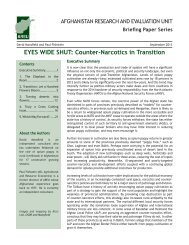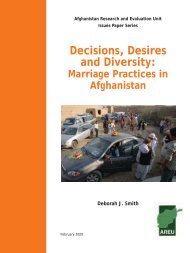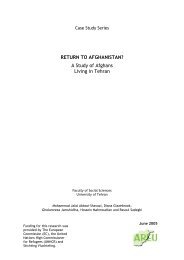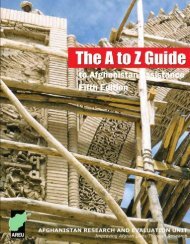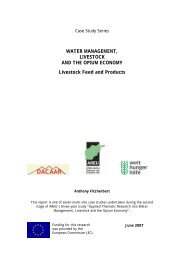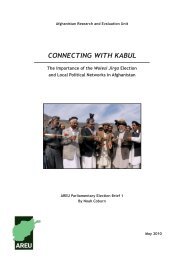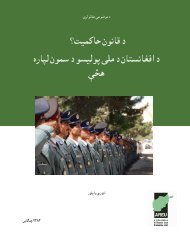Local Governance in Afghanistan: A View from the Ground
Local Governance in Afghanistan: A View from the Ground
Local Governance in Afghanistan: A View from the Ground
- No tags were found...
Create successful ePaper yourself
Turn your PDF publications into a flip-book with our unique Google optimized e-Paper software.
<strong>Afghanistan</strong> Research and Evaluation Unit<br />
2011<br />
failure of government to assert security <strong>in</strong> <strong>the</strong> prov<strong>in</strong>ce, it is significant that <strong>the</strong> commander chose<br />
to position himself as a reluctant leader. “I regret do<strong>in</strong>g this [lead<strong>in</strong>g <strong>the</strong> arbaki],” he stated <strong>in</strong> one<br />
<strong>in</strong>terview. “Every day I am tell<strong>in</strong>g <strong>the</strong> head of police and <strong>the</strong> governor that <strong>the</strong>y have blackened by<br />
name and shamed me.” 38<br />
4.5 Justice<br />
There are three major components to <strong>the</strong> state justice system <strong>in</strong> <strong>Afghanistan</strong>—<strong>the</strong> Office of <strong>the</strong><br />
Attorney General, <strong>the</strong> Judiciary operat<strong>in</strong>g under <strong>the</strong> Supreme Court, and <strong>the</strong> M<strong>in</strong>istry of Justice—<br />
each of which fulfil differ<strong>in</strong>g roles at <strong>the</strong> local level. There are two forms of justice <strong>in</strong> <strong>Afghanistan</strong>.<br />
The first is huqooq-ul-ibad—rights that are open to human <strong>in</strong>terpretation—and <strong>the</strong> second is huqooqul-Allah—religious<br />
rights that are non-negotiable and bound to be upheld by <strong>the</strong> state. 39 Non-state<br />
justice mechanisms make judgements on <strong>the</strong> basis of huqooq-ul-ibad but may not make any decision<br />
on <strong>the</strong> basis of huqooq-ul-Allah, which is <strong>the</strong> role of state justice mechanisms.<br />
The saranwal is located <strong>in</strong> <strong>the</strong> Office of <strong>the</strong> Attorney General and is responsible for process<strong>in</strong>g <strong>the</strong><br />
details of crim<strong>in</strong>al cases such as acts of violence, <strong>the</strong>ft, adultery and traffic <strong>in</strong>cidents. Narcotic<br />
crimes have a dedicated saranwal department. On be<strong>in</strong>g referred a case, <strong>the</strong> saranwal has 15 days to<br />
prepare <strong>the</strong> documentation and send it to <strong>the</strong> court through <strong>the</strong> M<strong>in</strong>istry of Justice. A trial <strong>the</strong>n has<br />
to take place with<strong>in</strong> two months. Cases come before a qazi who will make a judgement after hear<strong>in</strong>g<br />
<strong>the</strong> details of <strong>the</strong> alleged offence and <strong>the</strong> arguments of <strong>the</strong> saranwal and <strong>the</strong> defence lawyer. The<br />
lack of female representation <strong>in</strong> <strong>the</strong> Office of <strong>the</strong> Saranwal was a major problem for women, who<br />
found it difficult to share <strong>the</strong>ir problems with men.<br />
The degree to which cases were referred to <strong>the</strong> saranwal varied greatly between prov<strong>in</strong>ces and was<br />
<strong>in</strong> part <strong>in</strong>fluenced by whe<strong>the</strong>r judicial authorities were present <strong>in</strong> more remote or conflict-ridden<br />
districts. In <strong>the</strong> nor<strong>the</strong>rn three prov<strong>in</strong>ces more serious cases were commonly referred to <strong>the</strong> Office of<br />
<strong>the</strong> Attorney General. In some nor<strong>the</strong>rn districts mullahs played a role <strong>in</strong> decid<strong>in</strong>g which cases should<br />
be sent to <strong>the</strong> state. In Laghman more cases were heard before non-state actors. In Wardak <strong>the</strong><br />
state system was barely <strong>in</strong> evidence outside <strong>the</strong> ma<strong>in</strong> towns. In 2009, <strong>the</strong> saranwal of Jalrez District<br />
received only four cases, with <strong>the</strong> rest submitted to <strong>the</strong> Taliban.<br />
Judges operate under <strong>the</strong> jurisdiction of <strong>the</strong> Supreme Court, and many are graduates of Sharia<br />
(Islamic law). There are three courts or amiriyats: Dewani Jaza (crim<strong>in</strong>al), Dewani Madani (civil) and<br />
Dewani Amniyat Umah (public order). The judiciary ma<strong>in</strong>ta<strong>in</strong>s a firm degree of <strong>in</strong>dependence relative<br />
to o<strong>the</strong>r government <strong>in</strong>stitutions. All appo<strong>in</strong>tments and transfers are made by <strong>the</strong> president’s office.<br />
However, <strong>the</strong> capacity and reputation of <strong>the</strong> judiciary is generally poor. One judge said, “When I<br />
make a judgement <strong>in</strong> front of <strong>the</strong> court, I receive abuse and threats <strong>from</strong> disputants and crim<strong>in</strong>als.”<br />
Justice procedures are slow, record-keep<strong>in</strong>g is <strong>in</strong>efficient, trials were said to be perfunctory and<br />
<strong>the</strong>re is a shortage of defence lawyers. 40 The prestige of justice <strong>in</strong>stitutions was also dim<strong>in</strong>ished by<br />
<strong>the</strong> lack of resources for offices and courts—<strong>in</strong> one prov<strong>in</strong>ce <strong>the</strong> qazi and saranwal shared <strong>the</strong> same<br />
office.<br />
The Huqooq Department of <strong>the</strong> M<strong>in</strong>istry of Justice has <strong>the</strong> responsibility for deal<strong>in</strong>g with civil disputes<br />
and enforc<strong>in</strong>g civil judgments. It has l<strong>in</strong>ks with o<strong>the</strong>r parts of <strong>the</strong> justice system and traditional justice<br />
networks, which it relies on to help resolve cases by mediation or conciliation. If <strong>the</strong> differences<br />
<strong>in</strong>volved are irreconcilable, cases are <strong>the</strong>n referred to <strong>the</strong> courts. The Huqooq is also responsible for<br />
enforc<strong>in</strong>g court decisions on civil matters. Its three ma<strong>in</strong> areas of focus are property (often land),<br />
debt and family matters. 41<br />
38 “Former Taliban chief who became policeman says peace will never come,” http://www.shebacss.com/en/mediacenter-47712.html<br />
(accessed 30 November 2010).<br />
39 In <strong>the</strong> Afghan context, huqooq-ul-Allah may be equated to state or Sharia law. Huqooq-ul-ibad, though not legal <strong>in</strong> <strong>the</strong><br />
conventional sense, refer to how local notions of justice are formalised with<strong>in</strong> disparate communities.<br />
40 Personal communication with Laghman PRT legal specialist.<br />
41 UNDP, “The Huqooq Department: An Analysis of its Procedures, Functions and Needs” (Kabul: UNDP, 2010).<br />
<strong>Local</strong> <strong>Governance</strong> <strong>in</strong> <strong>Afghanistan</strong>: A <strong>View</strong> <strong>from</strong> <strong>the</strong> <strong>Ground</strong><br />
24



